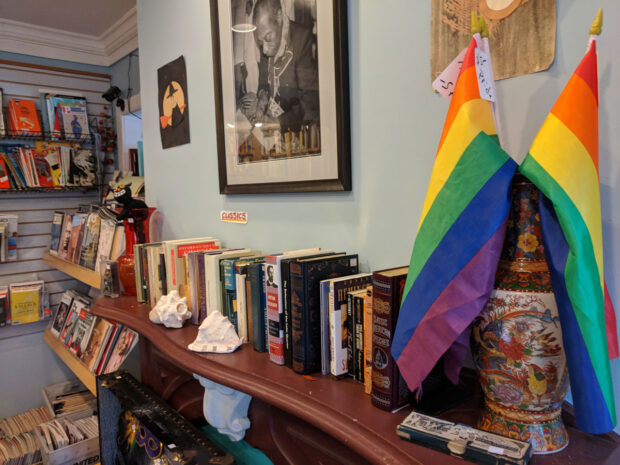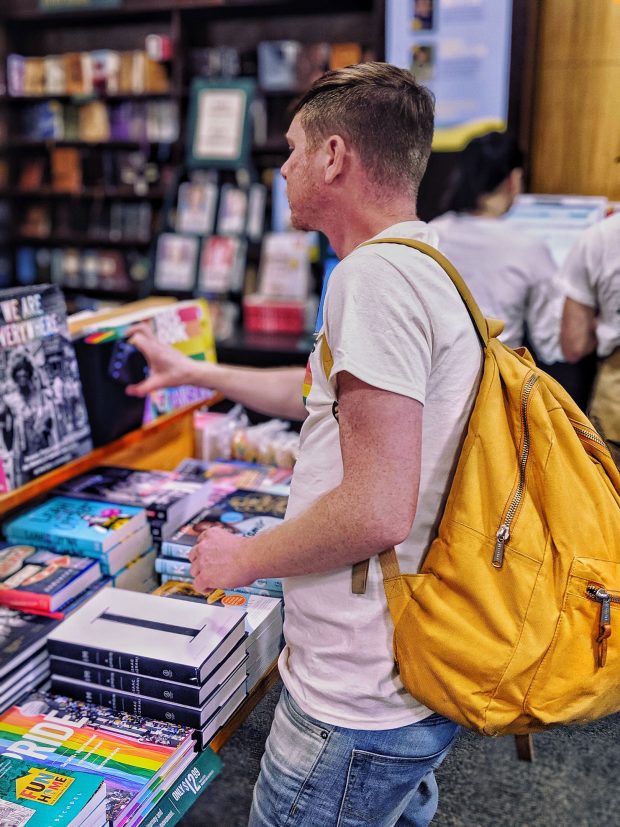Step into the vibrant world of queer fiction. This collection of books I’ve selected from a lifetime of reading (and working in publishing) are a brief dive into the rich tapestry of LGBTQ narratives. These gay fiction books celebrate the universal themes of love, identity, and the human journey.

Through fourteen diverse novels, you’ll get a front-row seat to the stories that often go untold. From E. M. Forster’s classic “Maurice” to the modern resonance of Andrew Aciman’s “Call Me by Your Name,” these books shine a light on the LGBTQ experience, capturing both the struggles and triumphs of characters navigating their way through a complex world.
Discover the raw and honest emotions in James Baldwin’s “Giovanni’s Room,” and the humorous, life-affirming journey in award-winning Andrew Sean Greer’s “Less.”
Armistead Maupin’s “Tales of the City” series offers a peek into the colorful lives of LGBTQ individuals in San Francisco, while Anne Rice’s “Interview with the Vampire” weaves in themes that resonate with anyone seeking to understand the essence of desire and connection.

These gay books (my personal favorites) are an opportunity not just to discover queer joy in the world, but an opportunity to discover a bit about yourself.
Reading is about the human desire to be seen, understood, and loved, regardless of who we are or whom we love.
These books remind us that everyone’s journey is worth exploring, and that’s why LGBTQ fiction holds a vital place in literature—because it reflects the beautiful spectrum of human experiences and emotions.
LGBTQ Fiction from Before the Gay Rights Movement
These books were all written in the early 20th century before the gay rights movement even began. For that reason, they hold a special place in my literary heart. These authors were able to capture queer joy in ways that were dangerous to themselves in case either the subtle undertones were discovered, or the
E. M. Forster – Maurice
This groundbreaking novel by E. M. Forster explores the challenges and complexities of same-sex love in early 20th century England. It follows Maurice Hall’s journey of self-discovery as he grapples with his feelings for other men and the societal expectations of his time.
Jane Bowles – Two Serious Ladies
Jane Bowles’ unique and enigmatic novel delves into the lives of two unconventional women, Christina Goering and Frieda Copperfield, who embark on separate quests for personal freedom. The story touches on themes of sexuality, identity, and nonconformity.
Truman Capote – Other Voices, Other Rooms
Truman Capote’s debut novel explores themes of identity and sexuality through the story of 13-year-old Joel Harrison Knox. When he moves to a remote Southern town to live with his estranged father, he encounters a cast of eccentric characters and discovers hidden truths about himself.
Christopher Isherwood – A Single Man
Set in 1962, this novel follows a day in the life of George Falconer, a gay English professor mourning the loss of his partner. As George navigates the challenges of grief and societal expectations, Isherwood’s introspective prose offers a poignant exploration of love and loneliness. Isherwood is a bit of a queer icon in gay Berlin, even today.
James Baldwin – Giovanni’s Room
In this poignant work by James Baldwin, an American living in Paris grapples with his own identity and sexuality. The novel revolves around David’s relationships with both Giovanni and Hella, shedding light on the complexities of desire, shame, and societal pressures.
Modern LGBTQ Fiction
Alan Hollinghurst – The Line of Beauty
Set in 1980s Britain, this novel traces the life of Nick Guest as he becomes entangled in the world of the wealthy and privileged. Alan Hollinghurst’s prose skillfully examines issues of class, sexuality, and the impact of the AIDS epidemic on the gay community. I’m also a fan of his book The Swimming Pool Library.
Annie Proulx – Brokeback Mountain
A short story that gained widespread attention through its film adaptation, “Brokeback Mountain” portrays the passionate and forbidden romance between two cowboys, Ennis and Jack, over the course of several decades.
Jeffrey Eugenides – Middlesex
This novel follows the life of Cal, a hermaphrodite, as they navigate their complex identity and family history. Spanning generations, “Middlesex” explores the interplay of genetics, gender, and self-discovery.
André Aciman – Call Me by Your Name
Set in Italy, this novel delves into the intense summer romance between Elio, a young man, and Oliver, an older academic. Their relationship explores themes of desire, attraction, and the fleeting nature of love.
Andrew Sean Greer – Less
“Less” is a comedic novel that follows Arthur Less, a middle-aged novelist, as he embarks on a journey around the world to avoid attending his ex-boyfriend’s wedding. Through his adventures, Arthur reflects on love and aging.
Bret Easton Ellis – Less Than Zero
This novel offers a glimpse into the lives of wealthy and disaffected youth in Los Angeles. Amidst themes of excess and nihilism, the book includes LGBTQ characters whose struggles add depth to the narrative.
Alice Walker – The Color Purple
While not exclusively an LGBTQ novel, “The Color Purple” explores Celie’s journey of self-discovery and empowerment as she finds love and connection with women, particularly her close friend Shug Avery.
Armistead Maupin – Tales of the City
Set in San Francisco, this series of interconnected novels offers a diverse cast of characters navigating love, friendship, and identity. It’s a celebration of LGBTQ culture and community during the late 20th century.
Anne Rice – Interview with the Vampire
The first book in “The Vampire Chronicles” series, “Interview with the Vampire” introduces the immortal vampire Louis and his complex relationship with Lestat. While not exclusively LGBTQ-themed, the novel contains rich subtext exploring the nuances of their bond.
These gay books remind us that literature’s power lies in its ability to bridge gaps, fostering empathy and understanding. LGBTQ fiction, with its kaleidoscope of characters and narratives, not only reflects the lives of its community but also speaks to universal longings for love, acceptance, and self-discovery.
